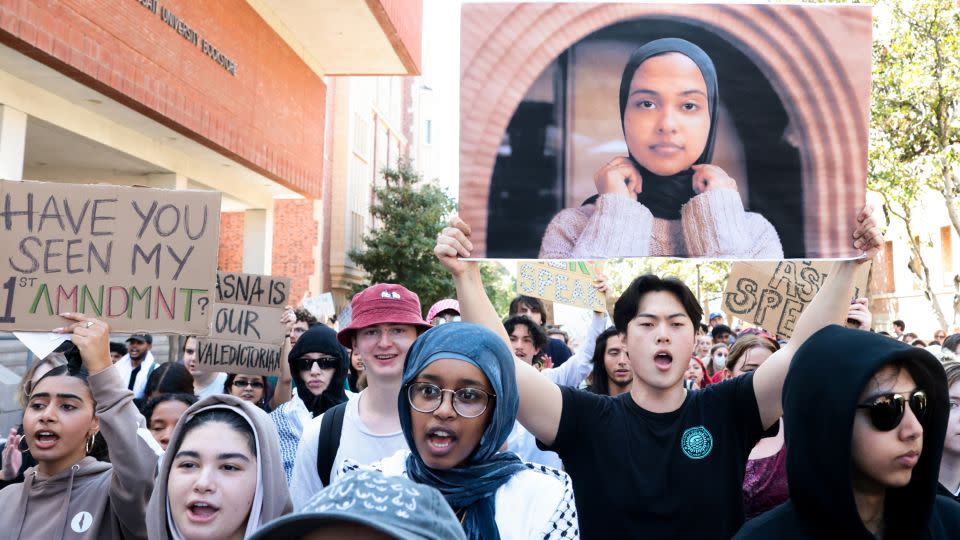USC calls off speaker appearances at 2024 commencement after canceling its Muslim valedictorian’s speech
- Oops!Something went wrong.Please try again later.
The University of Southern California announced it’s calling off appearances by prominent speakers and honorees at its graduation ceremony next month, days after the institution canceled the commencement speech of its Muslim valedictorian Asna Tabassum due to what it called security concerns.
USC said its decision to bar outside speakers from its 2024 commencement on May 10 is “to keep the focus on our graduates,” according to a statement posted on the university’s website Friday.
“Given the highly publicized circumstances surrounding our main-stage commencement program, university leadership has decided it is best to release our outside speakers and honorees from attending this year’s ceremony,” USC said in the statement. “It is important that our full attention be on our remarkable graduates.”
The university had planned to offer honorary degrees to filmmaker and alumnus Jon M. Chu, director of “Crazy Rich Asians,” alumna Maria Rosario Jackson, tennis legend Billie Jean King and geophysicist Marcia McNutt, according to an April 12 post on USC’s website.
“We’ve been talking to this exceptional group and hope to confer these honorary degrees at a future commencement or other academic ceremonies,” the university said Friday.
CNN reached out to USC for further information on the cancellations and was referred to the commencement update on the university’s website.
The move to cancel the speakers’ attendance comes just days after the university denied Tabassum – its 2024 valedictorian – the chance to deliver her commencement speech.
It also comes a day after hundreds of demonstrators congregated on campus to protest the cancellation of the speech, with many chanting, “Let her speak” during the rally, CNN affiliate KABC reported.

In announcing the decision to cancel Tabassum’s speech, the university said Monday that it “must prioritize the safety of our community.”
“Over the past several days, discussion relating to the selection of our valedictorian has taken on an alarming tenor,” USC Provost Andrew Guzman said in an online campus-wide letter dated April 15. “The intensity of feelings, fueled by both social media and the ongoing conflict in the Middle East, has grown to include many voices outside of USC and has escalated to the point of creating substantial risks relating to security and disruption at commencement.”
Lauren Bartlett, the university’s associate vice president for strategic and crisis communications, earlier this week declined to say what security concerns prompted the school’s decision. “In the interest of safety and security, we don’t disclose specific threats around the assessment,” Bartlett said.
As tensions in the Middle East rage on, Israel’s war on Hamas in Gaza has yielded a dire humanitarian crisis while stoking angst across the world as supporters of Israel and Palestinians advocate online and in the streets, many in support of a ceasefire.
USC student advocacy group Trojans for Israel accused Tabassum of sharing a link in the bio of her Instagram page that calls Zionism “a racist settler-colonial ideology” and advocates for the “complete abolishment” of Israel, it wrote in a social media post.
Tabassum – a first-generation South Asian American Muslim who studied biomedical engineering with a minor in resistance to genocide and an interest in global health care equity – said she posted the link three years ago as part of her commitment to stand up for human rights. She said the link details “what’s happening in Palestine, and how to help.”
“My goal when putting this link in my bio is to inform and in the spirit of academic discourse. I think people need to be informed, people ultimately can make their own decisions,” she told CNN.
“I don’t think, for example, my minor in resistance to genocide, or this link, should actually be looked in the confines or in the vacuum of the events after October 7th,” Tabassum said. “This is something that I have always stood for. And this is something that USC has taught me to stand for in terms of human rights.”
CNN’s Alisha Ebrahimji contributed to this report.
For more CNN news and newsletters create an account at CNN.com

